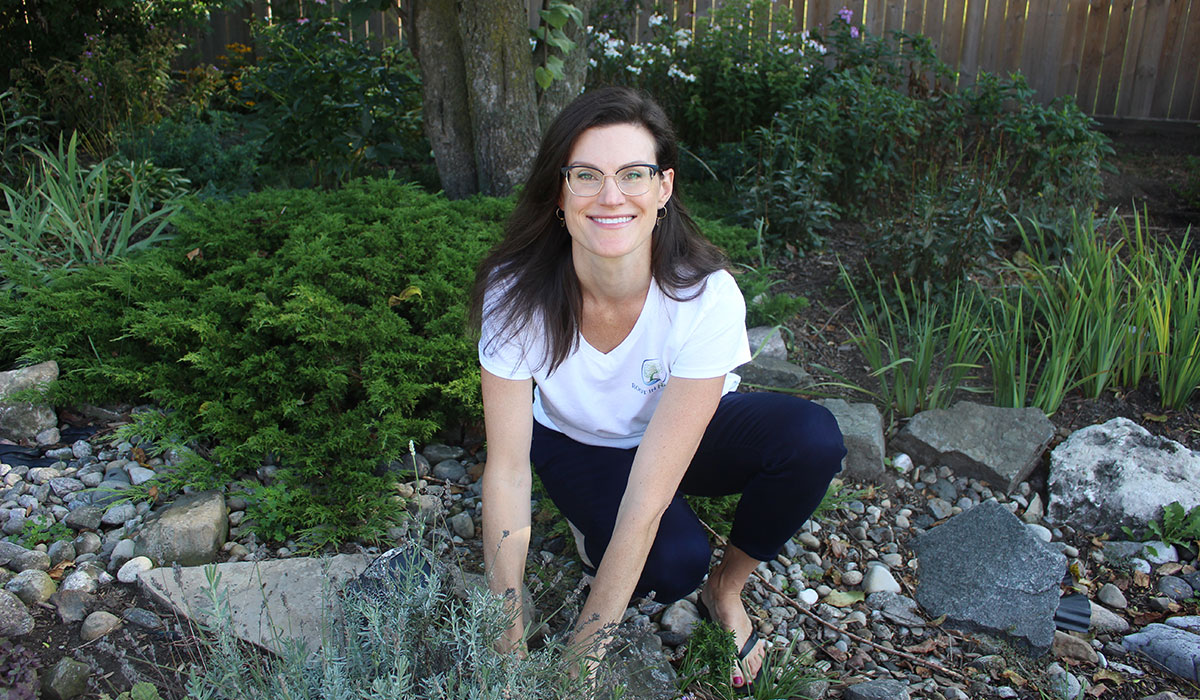One of the ways to seek peace and perspective in the face of such existential calamity is to spend time outdoors or with plants. This idea, that there is healing in nature, is at the heart of a social enterprise launched last year by Carleton University MBA graduate Alexis Ashworth.
“An abundance of research shows that people are emotionally, mentally and physically healthier when they interact with plants and the outdoors,” she says.
Ottawa-based Root in Nature offers horticultural therapy, nature-based programs and employee wellness sessions, all aimed at nurturing resilience, hope and mindfulness in these uncertain and turbulent times. And while there’s increasing demand for services that tackle anxiety and stress, Ashworth aims to do more than tap into a growing market.
“With a limited number of years on this planet,” she says. “I want to do something I’m passionate about and something that can help people.”
Ashworth, who left her job as the CEO of Habitat for Humanity Greater Ottawa in September 2021 to start Root in Nature, is part of a pandemic-prompted wave of entrepreneurs pursuing meaningful work. Initially, the trend that saw professionals leaving their jobs over the past couple years was dubbed “the great resignation,” but she suggests it should be called “the great realignment” because people are searching for paths that fit their personal priorities.
Root in Nature is a for-profit social enterprise, which means it’s structured like a conventional business, albeit one with an underlying goal of improving the lives of its clients. Rather than set up a non-profit organization governed by a board, Ashworth wanted to start a venture that she could own and operate for the rest of her career.
“The pandemic has exposed the need for more mental health supports and services,” she says. “There’s a lot of opportunity in this area.”
Horticultural Therapy for Holistic Health
This vision, and a staff of seven practitioners she can call upon, will allow her to grow the business sustainably, starting with horticultural therapy programs at the Just Food Community Farm in Ottawa’s east end and virtual gardening sessions this spring for non-profits that support seniors, young mothers and other communities.
Ashworth is also talking to companies that run retirement and long-term care homes, which serve a population that has been particularly impacted by the pandemic. Her team has started providing horticultural therapy for seniors with dementia at Symphony Senior Living and will begin providing services with Aging in Place at Ottawa Community Housing buildings this spring. Root in Nature also is partnering with the Children’s Hospital of Eastern Ontario (CHEO) to run programs for youth with autism and those who are struggling with what The Lancet calls “climate anxiety.”

“It’s a serious problem for many people, for youth in particular, and I couldn’t find any treatments that were focused on this issue,” she says.
“This is important to address, or we’re going to have a whole generation growing up with a sense of dread and doom about the future.”
On the employee wellness front, the Carleton grad has developed a lunch-and-learn presentation called Nature in the Workplace that shares practical tips to help workplaces support the health needs of staff.
“Several studies show that having a plant in every square metre of office space is optimal for enhancing productivity,” Ashworth says. “Beyond bringing plants inside, orienting desks toward windows or adding nature scenes can have a psychologically restorative effect.”
Decades of scientific research affirm the curative properties of nature, including a seminal study that showed post-operative patients whose hospital rooms had windows overlooking natural scenes recovered more quickly from their surgeries than people who had a view of a brick wall.
“It’s only in very recent human history that we’ve been living in an urbanized world, disconnected from wildlife and trees and the outdoors,” explains Ashworth. “Our brains are still wired to be in the natural world. This disconnect has a whole range of health implications.”
With a horticultural therapist on staff in Toronto and virtual programming available anywhere in the country, Root in Nature could expand across Canada within the next five years, says Ashworth. And though she doesn’t want to sacrifice her own work-life balance or mental health, her experience running a non-profit and earning an MBA at Carleton University were perfect preparation for this next step.
“I really love managing and overseeing things,” she says.
“In my role I focus on a lot of different aspects of the business and keep everything moving in the right direction, at the right time.”